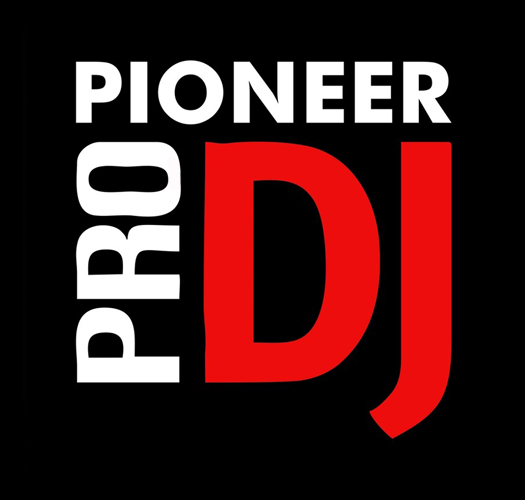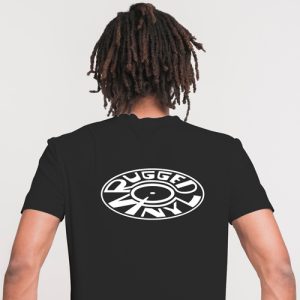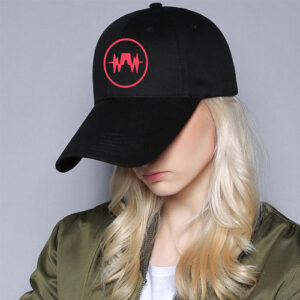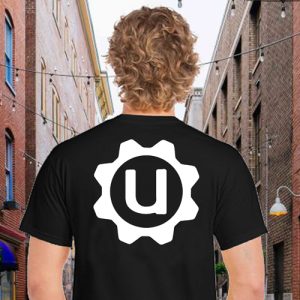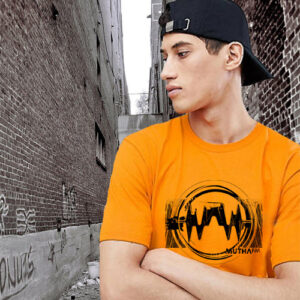An entrepreneurial, hustler spirit pervades throughout Nigeria, and when merged with exceptional creativity we see something special occur. Nowhere is this more apparent than in the meteoric rise of afropop over the past decade, with artists like Wizkid and Burna Boy cementing themselves globally as household names.
However in more recent years, a new crop of alternative artists are forging a more experimental path, collecting sounds from far and wide to create something completely new; and in doing so, challenging society’s rigid ideas about what it means to be a young creative from Nigeria today. British-Nigerian DJ and radio presenter DJ Femo is one of these creatives, who energetically highlights the boundless creativity coming from Nigerian youth culture and shares it with the world.
Read this next: Why Teni The Entertainer is a new kind of pop star
Born in multicultural South London, Femo grew up following her mum from hall party to hall party on weekends and attending a diverse school throughout the week. When she was 13, she moved to Lagos to stay with her father and complete her schooling. It was between these dual experiences that her sound as a DJ began to form; soaking up the music she heard on Choice FM out of London while simultaneously picking up mix CDs from the street markets in Lagos.
Since moving back to London, Femo has fully thrown herself into a career in music. On her monthly show So Rad on Reprezent Radio she’s the “plug to ur west african vibes”, and she’s now also joined the ever-growing Black-owned radio station No Signal. Femo’s new show on No Signal, Welcome To Chaos displays another side to her musicality, a closer look into her “chaotic mind” as she draws from a wider net of people, places and pop culture references that inspire her.
Step further into her wicked sound with her Impact mix and Q+A below.
Was music something you were always interested in?
Yeah definitely, since I was born. There’s a tape from my first birthday and I couldn’t even walk, I couldn’t stand by myself, but they were holding me up and I was dancing on the speaker. I was always near the DJ booth. I grew up in a community where there were a lot of parties and I think my mum was the first to have a kid out of all her friends and family so I was always there, I was always in the mix. That was like my whole childhood, just going to parties on the weekends with my mum. We’d come back at like 3am and I guess that’s how I fell in love with DJing.
So your love for DJing started early. And you were always just watching the booth, watching who was playing?
It wasn’t about who was playing, it was about how they were playing. Because I think the only famous DJs that I really knew of at the time were DJ Abass, Jimmy Jatt and Jazzy Jeff and then obviously EDM DJs but I didn’t know about that until much later. So it was more about how people played for me, like their transitions. I used to beg my mum for the decks from Argos, from the Argos book.
I didn’t know Argos sold decks!
Yeah they did! And I begged her to get it but she couldn’t so I forgot about it for a bit. Then when I was 17, I started at the University of Bradford and there was a huge culture of partying and in the Black community at uni most of the boys were DJs so everyone had their own little promotions going on. In Lagos I wasn’t allowed to go to most of the parties but the ones I went to, a bunch of boys would start their own entertainment group, they would realise it was a lucrative business and then they’d get their friends to DJ.
At the parties I attended, I remember being really angry with bad transitions. Because it kind of spoils the vibe you know? Because if you’re DJing and there’s a bad transition it just ruins the momentum. Since I was a kid I just found myself getting very angry with people who weren’t very good at DJing.
So at uni you started to think about learning to DJ yourself?
Yeah, at a point I said okay all these boys are doing it, so let me try. I bought decks from this guy – I don’t think I’ve even still finished paying him off – and I had a friend who knew how to DJ so we would just sit, smoke weed for hours and I would just learn. I would do a transition and he would look at me if it was bad. There would be a way he would look at me if it was bad and if it was good. He’d be playing PS4 and I’d be DJing and that was it everyday for a couple of months until my first gig in October 2015.
I really enjoy your mixing style. You always use the most exciting part of a track and you don’t leave it in too short or too long. How did you develop that style?
I literally taught myself. I just used my spirit really. The way I vibe with the song – as I said what I’m trying to do is maintain a momentum. So if it’s a dance set, I’m trying to keep you dancing, if it’s a feelings set, I’m trying to make you feel. And if I’m just enjoying the songs, then I’m trying to maximise your experience of how you’re going to enjoy the music.
Do you think growing up between London and Lagos impacted your selections and the way that you approach DJing?
Definitely. Growing up, every morning I’d put on KISS FM, 1Xtra, Choice FM, all that stuff; but at the same time I was also listening to CD mixes from Alaba Market, from all these DJs like DJ Kaywise and all the older DJs. You know those CDs that you literally get from streets and they’re just mix CDs? That was what I was hearing growing up and then going to all these parties that I went to with my mum, all these hall parties, house parties, barbecues. I just soaked everything in.
And so now it just naturally comes out as your style?
Yeah it’s just instincts, I can’t really explain it. For me it’s really easy, so I’m always trying to push my boundaries. I guess that’s what I’m doing with [my show on] No Signal. I’m allowing myself to be more free in my format.
Yeah I hear that in your new show. So how did you get into radio? I know you started out with Reprezent.
I came back to London from Nigeria, after I did a couple of months out there and after dropping out of Bradford. I came back with the mindset of: OK so now I really need to hustle and try get myself on radio. Because when I was a kid, I think my first ever goal was like ‘Ah this is something I want to do, I want to own a radio station’. So I just started emailing everyone I looked up to or everyone that was in the lane of what I was trying to go for, and I started researching who was doing what.
How would you describe your earlier shows on Reprezent?
I was covering afrobeats at the time. My show was all about African music and showing off diversity in African music. So it’s not just the umbrella label ‘afrobeats’. It’s people that make trap, people that make r’n’b, people that make house music – and not just afro house but actual house music – and people that are in alternative rock bands. It was really just about showcasing talent that comes from Africa and its diaspora. Mainly Lagos, I won’t lie to you, mainly Nigeria. I mean that’s where I’m from, so it’s only natural that I’m going to tap into everything I see around me.
And how did you come to land on No Signal?
No Signal happened during quarantine. At the beginning of quarantine, Jojo [the co-owner] hit me up and said he’s doing this live stream thing and I could literally just stream live from my laptop at home, so I did it a few times. This was before NS10vs10 so it wasn’t official or anything. And then after NS10vs10, I think after the Wizkid vs Vybz Kartel one, they said okay let’s take this seriously and I got a slot on there through that.
It makes sense you being on the station, it’s a really good fit. So how would you describe your new show Welcome to Chaos?
So Welcome to Chaos – that encapsulates everything. It’s literally just me being free. I’m sharing music that I listen to day-to-day but in a creative way. I’m throwing in sound bites from places and just showing you my chaotic mind. I feel like I still haven’t been able to fully express what I’m trying to do just yet but I think with time it’s going to come together in a crazy way.
But I’ve been having a lot of fun producing it because I’m doing it at home and I don’t have a mic or the normal studio equipment. I’m using my iPhone to create soundbites and I’m asking people to send in VNs [voice notes] and I think that has really boosted my creativity in that it helped me realize I can really do anything.
So the change of environment has inspired you in a different way?
Yeah, and just playing music from everywhere as opposed to just focusing on African music. So this is more just an expression of me rather than everyone else. I’m still going to do So Rad when things are more stable, and I’ll still be focusing on African music and showcasing that talent. But I feel like this is an avenue to showcase that I listen to other things and I’m good at DJing in other ways too.
How do you feel about No Signal and why do you think it’s important to have a radio station that’s run by Black people for Black people?
It’s important to have Black-owned media where we can have full creative control, full financial control and just control generally. We can control our own narratives. It’s the same way I’m really passionate about The Natives magazine because it’s something for us by us. We can create our own narratives and build our own selves up and give ourselves the opportunity to express ourselves the way we want. Because we’re not being confined to any outside image of what we’re supposed to be, because we can only be what we are if that makes sense.
I wanted to talk to you about representation as well, because I think with afrobeats getting bigger each year, it’s given a sense of identity to young African kids but I know part of what you’re passionate about is broadening that representation. How do you feel about West African or Nigerian representation in music today and how it’s evolved? Because I’m sure growing up in the UK it was quite different when you were younger.
Yeah we were not out here, not even West Africans but just Black people in general. I remember when I was a kid, I had a moment when I was looking in the mirror like ‘Why is my hair like this? Why is my skin like this? How come I’m different to my classmate Ashley? How come her hair is straight?’ I feel like now that we’re seeing more Black people in the media, it’s so beneficial to children because they don’t have to doubt [who they are].
And now with me trying to broaden the perspective of what it is to be African, I’m trying to tell all the weird kids that are sat in the corner listening to music or reading a book, listening to ‘weird white people stuff’ [or that are] into different things than most Black people would typically be into, that you’re still authentically African and you’re still authentically Black just because you’re into different things. You can still be alternative and be authentically Nigerian, or African or from South London. So dress the way you want, express yourself the way you want and don’t feel confined to an identity because the more you hold on to an identity the more you lose yourself.
Read this next: Motherland is the epicentre of London’s Afrohouse movement
How do you feel your career is perceived when you’re in Lagos?
I feel like I don’t really give face to that. I’m just unapologetic, I don’t really care so I don’t see it. Sometimes I become aware within my own community of Nigerians in London like yeah I guess you might not be taking me so seriously because I’m a DJ and you’re a lawyer or whatever, but at the same time I feel like I’ve built myself up to this position so I don’t really care because in what I’m doing, I’m doing something big. So my own achievements are what drives me.
My family I think are kind of confused with the direction I’m heading in, maybe a bit scared but as long as I know that my head is on straight and that I’m moving closer to my goals then I’m not really worried about how anybody else feels. It’s like Burna Boy sang “Make you no follow me run my race, E be like sey dey don dey craze”. Like it’s my race so I don’t really care.
So what’s exciting you about music and youth culture right now, whether that’s in London, Lagos or wherever?
I feel like sounds are changing right now. People are getting more into this Amapiano thing and there’s more trap going on. I just want to hear badboy music, I won’t lie. I feel like people are getting more comfortable expressing. Like Odunsi’s new music is the perfect sound for me. The wicked, sexy ‘Everything You Heard Is True’ EP is perfect. People like Maison2500 are making seriously experimental trap that three years ago, nobody would have really turned their heads. With Santi’s new music now, there’s drill influences in the percussion but it’s still very much his sound, so I’m just excited to see how people explore and merge sounds more.
It’s nice to see that people are becoming more open minded towards different kinds of sounds, so I think that’s really exciting. People aren’t afraid to make what they want to make. No one is like ‘I have to make afropop’ anymore or ‘I have to appease what I think what my community wants’. There’s more freedom to be.
Can you tell us about your Impact mix?
Oya! Everything stew…
(Via Mixmag)
